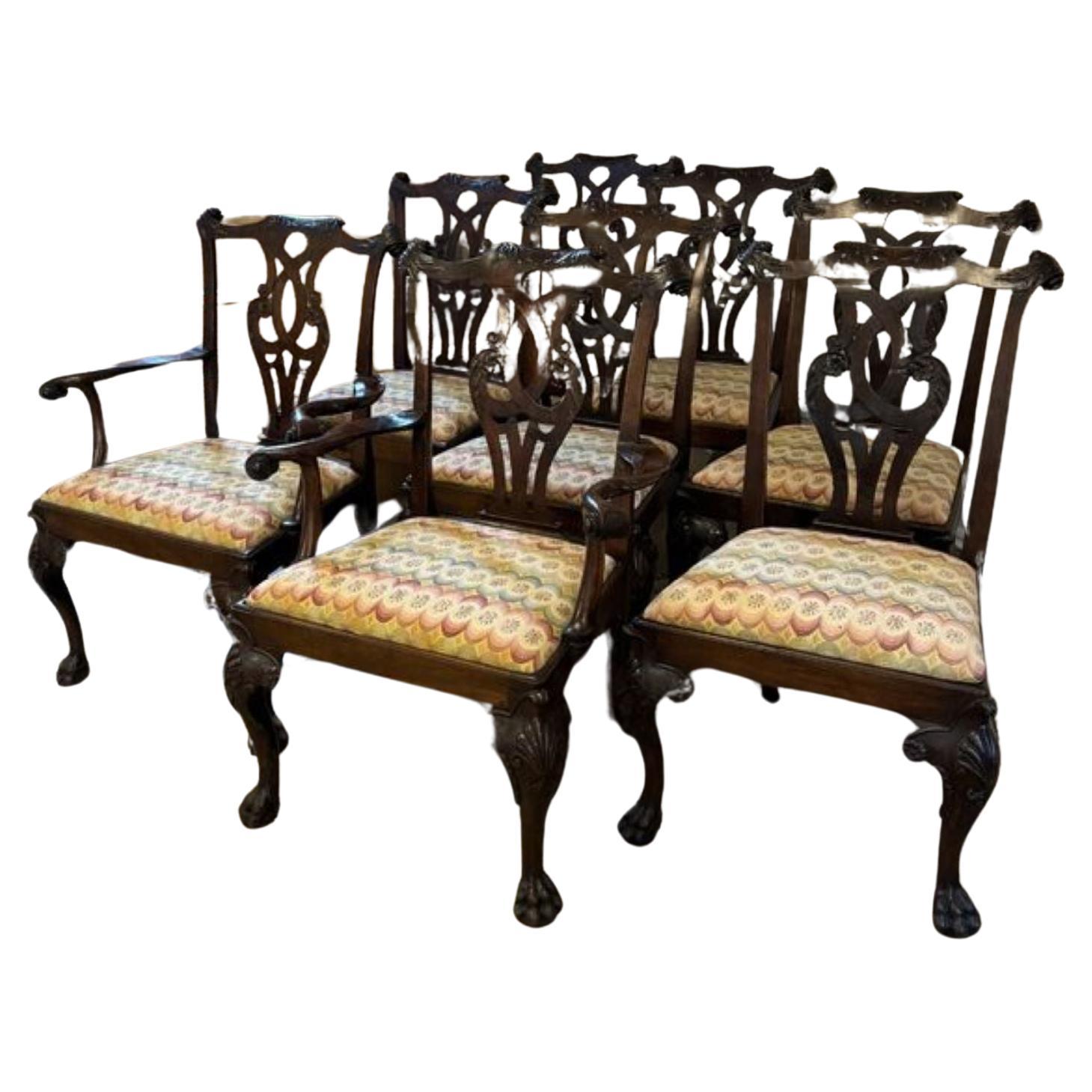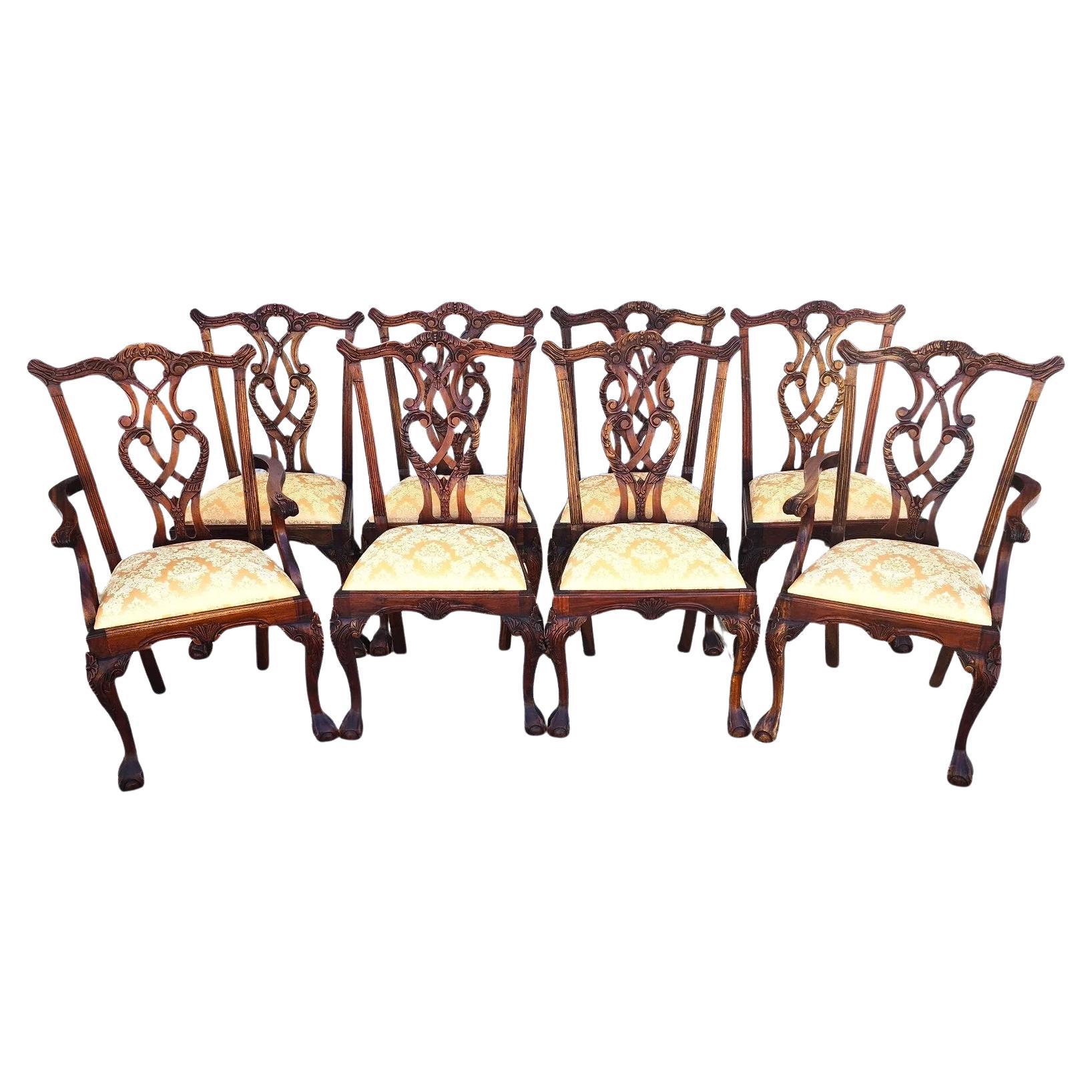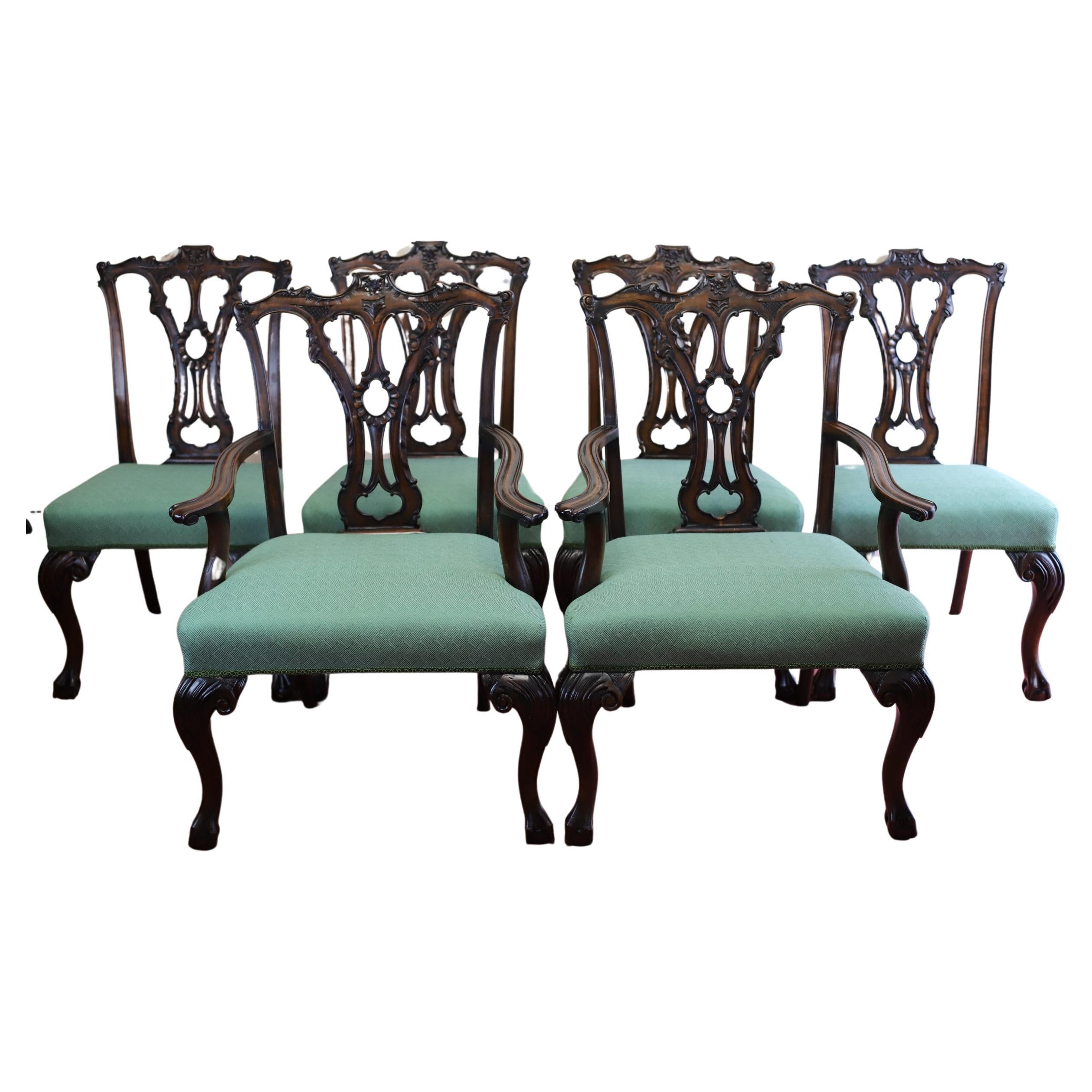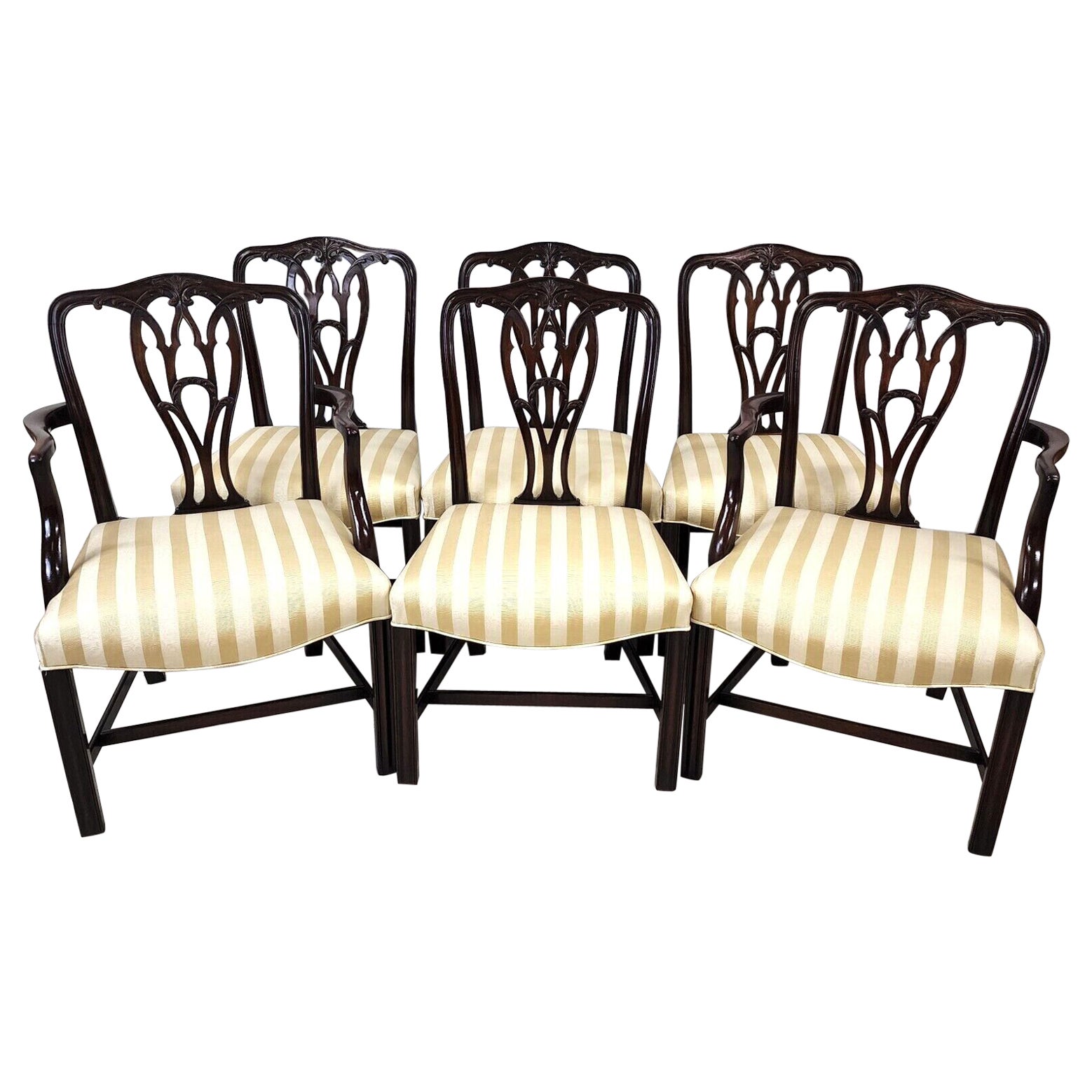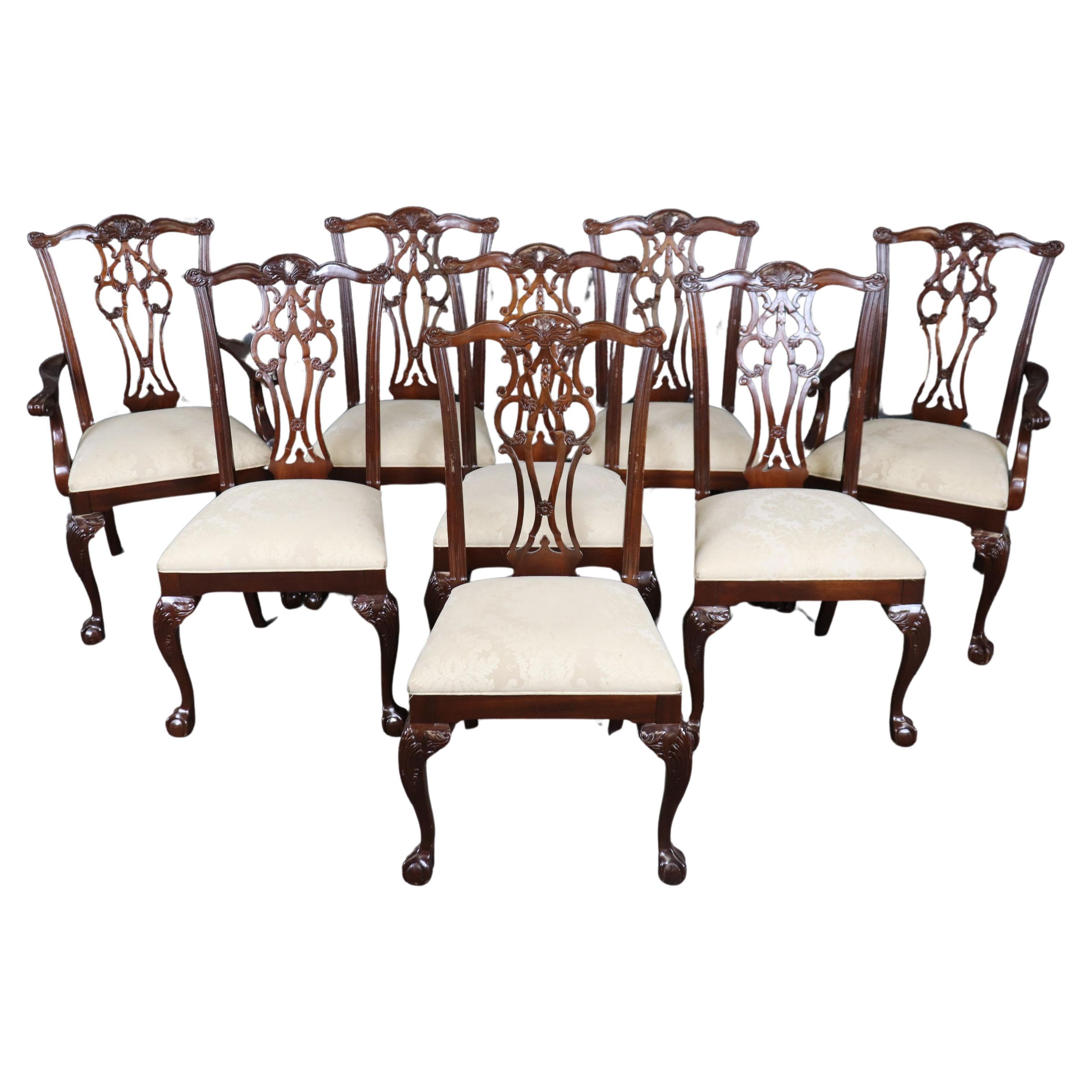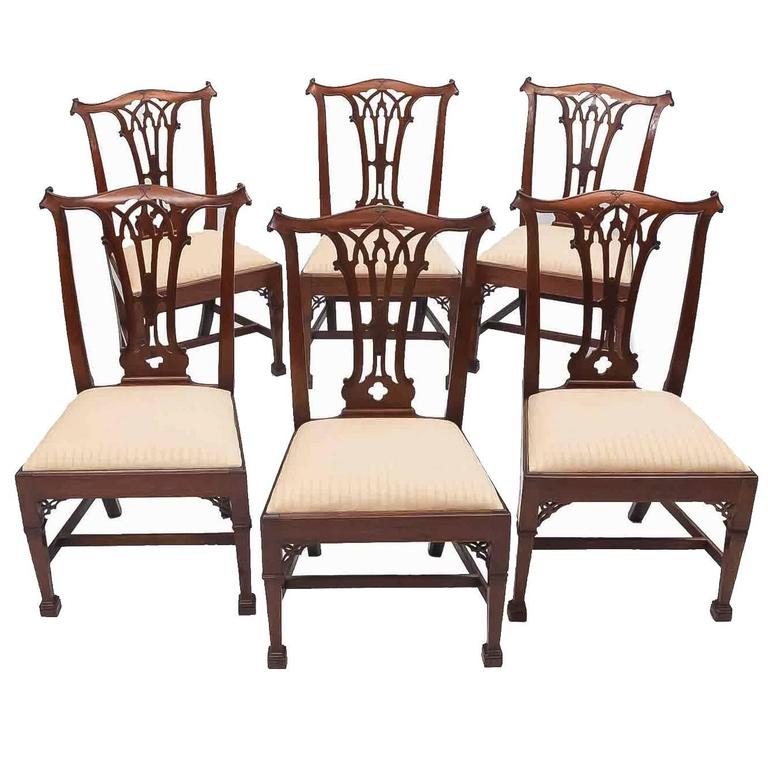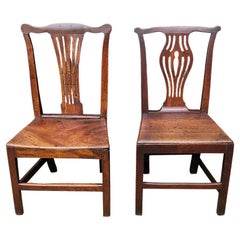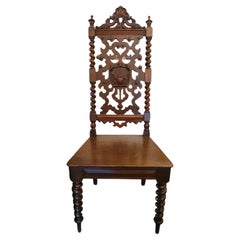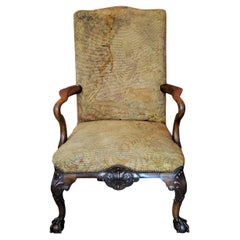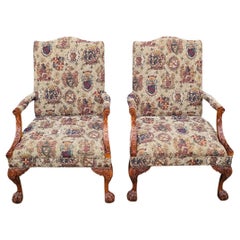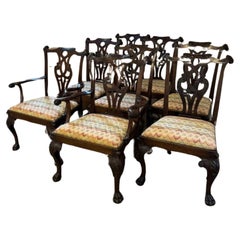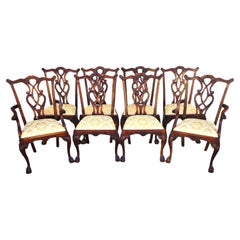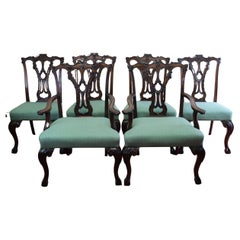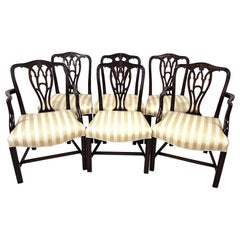Items Similar to 19C Set of 6 Irish Chippendale Style Ribbon Back Dining Chairs
Want more images or videos?
Request additional images or videos from the seller
1 of 17
19C Set of 6 Irish Chippendale Style Ribbon Back Dining Chairs
$14,000
£10,577.70
€12,252.74
CA$19,723.42
A$22,013.42
CHF 11,531.23
MX$268,419.60
NOK 145,836.16
SEK 136,760.60
DKK 91,454.16
About the Item
Presenting a fabulous 19C set of 6 Irish Chippendale style ribbon back dining chairs.
Irish made circa 1840-60.
We know that these are Irish due to the signature ‘hairy paw’ feet which is synonymous with Irish Georgian furniture that were made in the Chippendale Style.
These are hand crafted chairs, made of mahogany, and have fabulously detailed ‘Ribbon’ backs splats with tassel, acanthus floral and bow details.
All 6 have been re-upholstered by us in a gorgeous tan/light gold silk damask fabric which is beautifully sympathetic to the style and period.
We are confident that these are Early to Mid 19th Century chairs for a number of reasons: (1) The are hand crafted, (2) the color/patina is what you would expect with natural aging, (3) they have evidence of historic repairs, wear and tear consistent with age, (4) when we removed the old upholstery fabric, which looked like it was done in the 1980’s, we discovered the original ‘horse hair’ cushion filling … this practice stopped in the early 20th Century. The seat webbing was also much older and needed replacing.
Fabulous acanthus carving on the knees of the front legs, with curved legs leading down to the fabulously carved hairy paws.
Nice indented decoration on the front of the seat.
The rear legs are undecorated and curve outwards for additional support and stability.
Unsigned and unmarked but undoubtedly made by a top Irish furniture maker. probably in Dublin.
Condition: Each chair has been newly re-upholstered and seat webbing replaced. The original horse hair cushion filling was cleaned and incorporated into the new cushion with modern foam to create a more comfortable and uniform seat cushion, but still retaining originality.
Each chair has signs of historic repairs to the ribbon back splats over the generations. This is not unusual due to the somewhat delicate nature of these types of back splats. Also, it is an indicator of true age. The chair to the back left in the main photos has had the most repairs and much more recently performed (by us) as the back splaty was broken in 2 places (but we had the original pieces) and the chair needed the insertion of metal pins to secure the repaired sections. We have provided a couple of photos of this back splat which you can see evidence of the repairs.
The repairs are very professionally done and the chair is now fully functionable and usable and the repairs are not very noticeable.
These repairs are reflected in the pricing, as, if these chairs were ‘mint’ they would be very valuable and expensive !
Irish furniture can be recognised by certain features, which differentiate it from its European counterparts. The Irish style of furniture is said to have been lagging behind in fashion compared to English equivalent by a number of years, in both its design and manner by which the furniture was manufactured. A defining feature of the mid-eighteenth-century furniture is the carving on different parts of the furniture such as the aprons, blanket chests, bottle-stands and such objects. The carvings included foliated details, baskets of flowers and scallop shells, which are some of the most prominent carvings that are represented on Irish furniture at this time. A few of the Irish makers of these objects were James Hicks, Arthur Jones, William Moore, Mack & Gibton and Robert Strahan. All though individuals would have been the most prominent at the time of the 18th century and early 19th century but there are any other cabinet makers as well.
Not all Irish furniture was detailed with such wonderful carvings and some might have been seen to be rather plain. One of the most identifiable items that are described as plain is the Irish Hunt Table, its simple elegance comprising of with straight plain legs. It was most commonly used in the dining room of a rural house such as a agents house or large house of a land holder. Another very popular and simply designed piece was the Irish Silver table, its design is very elegant and yet individual partially owing to the shell motive.
Other examples of such Irish tables are side tables which have a distinctive double scrolled leg. Usually legs are carved with acanthus and have paw feet which are quite popular in Ireland but more rare in England. Other features are the inside leg which is carved with elongated C-scroll. The triple scroll on the leg was common place. Some cabinet makers and creativity was really captured with their side tables in how the carving was done. This carving may include Jupiters eagle or Lion mask and flanked Swags of flowers. In other furniture such as chairs, the H-shaped serpentine stretcher was popular in the 18th century in Ireland and when English chairs had moved forward in their design the Irish makers were still using the H-shaped serpentine. There was certainly an overlap between Irish and English furniture, one can see that Irish cabinet makers used English pattern books but used Irish features such as the carvings as the shell, baskets of flowers and foliated details. Another unique feature in Irish cabinet making was Killarney ware, its Arbutus wood unique to Killarney County Kerry and how the inlay was designed was unique in the mid 19th century period and in Irish cabinet making. These creations made the Irish furniture unique throughout the 18th, 19th and early 20th century.
Dimensions: Each chair is 39 inches tall, 22 inches deep and 24 inches wide
Seat height is 19 inches
Seat cushion is 17 inches wide at front.
Depth of seat Cushion is 22 inches
Provenance: From an Irish American Estate in Virginia.
- Dimensions:Height: 39 in (99.06 cm)Width: 24 in (60.96 cm)Depth: 22 in (55.88 cm)Seat Height: 19 in (48.26 cm)
- Style:Chippendale (In the Style Of)
- Materials and Techniques:
- Place of Origin:
- Period:
- Date of Manufacture:1840-1860
- Condition:Rewired. Repaired: See full listing. Reupholstered. Wear consistent with age and use. Minor losses. Minor structural damages. Minor fading. Good original condition, with some historic and more recent professional repairs (see full listing).
- Seller Location:Dallas, TX
- Reference Number:1stDibs: LU3978129559262
About the Seller
4.9
Vetted Professional Seller
Every seller passes strict standards for authenticity and reliability
Established in 2015
1stDibs seller since 2018
391 sales on 1stDibs
- ShippingRetrieving quote...Shipping from: Dallas, TX
- Return Policy
Authenticity Guarantee
In the unlikely event there’s an issue with an item’s authenticity, contact us within 1 year for a full refund. DetailsMoney-Back Guarantee
If your item is not as described, is damaged in transit, or does not arrive, contact us within 7 days for a full refund. Details24-Hour Cancellation
You have a 24-hour grace period in which to reconsider your purchase, with no questions asked.Vetted Professional Sellers
Our world-class sellers must adhere to strict standards for service and quality, maintaining the integrity of our listings.Price-Match Guarantee
If you find that a seller listed the same item for a lower price elsewhere, we’ll match it.Trusted Global Delivery
Our best-in-class carrier network provides specialized shipping options worldwide, including custom delivery.More From This Seller
View AllPair of British Country Squire's George II Side Chairs
Located in Dallas, TX
Presenting an absolutely gorgeous pair of British Country Squire’s George II Side Chairs.
When we say that we ‘LOVE’ our antiques to be of quality, ...
Category
Antique Mid-18th Century English George II Side Chairs
Materials
Elm, Oak
19C English Rococo Revival Ecclesiastical Oak Hall Chair
Located in Dallas, TX
PRESENTING a FABULOUS 19C English Rococo Revival Ecclesiastical Oak Hall Chair.
Made in England (Britain) circa 1870 in the Rococo Revival Style from sol...
Category
Antique 19th Century English Rococo Revival Chairs
Materials
Oak
18C English Chippendale Shepherds Crook Armchair
Located in Dallas, TX
Presenting an absolutely stunning and original 18C english chippendale shepherds crook armchair.
Made in England circa 1780-1800 of walnut, this ‘period’ chair is simply Gorgeous in it’s Originality!
It is still covered in it’s original needlepoint/tapestry upholstery with neo-classical elements of a Greek or Roman Goddess sitting holding a staff on the back splat and floral motiff’s elsewhere.
What makes this piece Truly Original is the fact that the needlepoint appears to have been signed by the original owner/maker of the tapestry and it appears to be the family name of “Tancret”.
The arm rests have the most glorious ‘shepherd’s crook’ twists and turns.
The central base section has what appears to be heavily carved Prince of Wales Plumes, signifying the Regency Era.
The knees of the 2 front legs have the most amazingly carved acanthus relief decoration and the 2 front legs end in the best example of ball and claw feet you are ever likely to see.
The back legs also have some interesting detail as the feet are platformed or hooved.
Overall, the piece is in great condition for it’s age and use. There are no major tears or holes in the original tapestry. There is some discoloration but that is to be expected with a piece this old.
There is a very small piece of the central front medallion (bottom left as you look) missing, but it is not noticeable and does not detract from the piece.
One small stain on the back.
Gorgeous natural patina to the wood.
Provenance: From a Wealthy Estate in Kentucky/Tennessee
Condition: Very good. See full description.
Dimensions: 44? tall, 28? wide and 27? deep
Seat height of 18.5? with seat depth of 17.5? and interior seat width of 22.5?
Armrests are 26.25? Tall
The vast movement of people that followed the Norman Conquest of England in 1066 brought the Tancret family name to the British Isles. Tancret comes from the ancient Norman given name Tancred. The Tanksley variant is indeed rare. However, this name traces its origin to Roger Tankerlayman who was listed in Yorkshire in 1387.
Because of this political and religious unrest within English society, many people decided to immigrate to the colonies. Families left for Ireland, North America, and Australia in enormous numbers, traveling at high cost in extremely inhospitable conditions. The New World in particular was a desirable destination, but the long voyage caused many to arrive sick and starving. Those who made it, though, were welcomed by opportunities far greater than they had known at home in England. Many of these families went on to make important contributions to the emerging nations of Canada and the United States. Analysis of immigration records indicates that some of the first North American immigrants...
Category
Antique Late 18th Century English Chippendale Armchairs
Materials
Tapestry, Walnut
Pair of Gainsborough Library Chairs in the Irish Georgian Style
Located in Dallas, TX
PRESENTING A GORGEOUS and INTRIGUING Pair of Gainsborough Library Chairs in the Irish Georgian Style.
Made of walnut, probably in the 1980’s and probably made and upholstered in the US ….. for the ‘amusing and ironic’ reasons, we will ‘delve’ into later in this posting!
This pair of beautiful re-production chairs, were styled upon “Gainsborough’ Library Armchairs, from the Georgian Era of British & Irish furniture.
This pair were specifically styled on the ‘Irish’ Georgian Style, with the ‘hairy paw’ feet and the ‘Celtic Knot” motif on the armrests. Both motif’s being, ‘synonymous’, with Irish Georgian furniture in the mid to late 18th Century!
Both are upholstered in an antique style, ‘Coat of Arms...
Category
20th Century American Georgian Armchairs
Materials
Fabric, Walnut
19th Century American Walnut Childs Chair with Provenance
Located in Dallas, TX
Presenting an absolutely stunning and historic 19th century American walnut childs chair belonging to Lida Calvert Hall 1867.
This Chair has impeccable provenance:
It is part o...
Category
Antique Mid-19th Century American American Craftsman Chairs
Materials
Walnut
19th Century Irish Country Squires Mahogany Hunt Table
Located in Dallas, TX
Presenting a gorgeous 19th century Irish country squires mahogany Hunt table.
This table was made in the late 19th century circa 1880, and is made of solid mahogany and sits on 8 legs with padded hoof feet.
2 drop leafs on either side supported by swinging gate legs on either side when upwards.
Beautiful interlocking detail to the side leafs and central section.
Oval in shape …. it would comfortably seat 8 people.
Made in Ireland.
This is a ‘Hunt’ table and not to be confused with an Irish ‘Wake’ table.
Whilst ‘Hunt Tables’ and ‘Wake Tables’ are similar in shape and design their original purposes could not be more different.
Wake Tables were made and used by indigenous Irish people for 2 purposes: (1) As a full functional dining table and (2) the central section had to be of sufficient width and length to support a coffin for the purpose of ‘waking’ the deceased in their home. Wake Tables were almost always made of oak, as this was the most common wood found in Ireland and therefore available to the ordinary (and poor) Irish Folk. Sometimes they might also be made of elm or sycamore.
Hunt Tables. however, we not made for the purposes of holding a coffin or ‘waking’ the dead. They were made for the ruling classes, nobility or gentry for the sole purpose of use on the day of the ‘hunt’. This would be the fox hunting season of Fall and Winter, where the participants in the ‘hunt’ would gather at the local manor house early in the morning and the snacks and refreshments would be displayed for eating and drinking on the ‘hunt’ table. Hunt Tables are almost always made of mahogany which was an expensive and exotic hardwood imported from Cuba and the West Indies. When not in use they would be put up against a wall with the leafs down and items would be displayed on top.
This table is obviously a ‘hunt’ table because: (1) It is made of mahogany (2) the central section is not wide enough to safely hold at coffin at rest.
We are of the firm opinion that this is in fact an Irish-made Hunt Table due top the legs and padded hoof feet which more closely resemble the feet one would find on an Irish Wake Table...
Category
Antique Late 19th Century Irish Georgian Dining Room Tables
Materials
Mahogany
$3,840 Sale Price
40% Off
You May Also Like
Outstanding quality set of eight Irish Chippendale style dining chairs
Located in Ipswich, GB
Outstanding quality set of eight antique Victorian mahogany Irish Chippendale style dining chairs, consisting of a pair of elbow ...
Category
Antique Early 19th Century Early Victorian Dining Room Chairs
Materials
Mahogany
Antique Chippendale Dining Chairs Set of 8
Located in Lake Worth, FL
For FULL item description click on More Details below.
Shipping Quote Information
The shipping quote stated in the listing was from 1st Dibs and they normally set all the costs and ...
Category
Vintage 1940s Chippendale Dining Room Chairs
Materials
Mahogany, Cotton
$4,295 / set
Stunning Set Of Six Chippendale Style Dining Chairs
Located in Crawley, GB
We delight to offer for sale this fantastic set of six carved mahogany and upholstered dining chairs in Chippendale style, late 19th century and later reupholstered; the openwork bac...
Category
Antique Late 19th Century British Chippendale Dining Room Chairs
Materials
Hardwood
$1,850 Sale Price / set
20% Off
Chippendale Dining Chairs Antique 1800s Mahogany, Set of 6
Located in Lake Worth, FL
For FULL item description click on More Details below.
Shipping Quote Information
The shipping quote stated in the listing was from 1st Dibs and they normally set all the costs and ...
Category
Antique Late 19th Century Chippendale Dining Room Chairs
Materials
Cotton, Mahogany
Fine Set of 8 Chippendale Style Ball and Claw Dining Chairs
Located in Swedesboro, NJ
This is a gorgeous set of 8 solid mahogany Maitland Smith attributed Chippendale dining chairs in good original vintage condition. The chairs feature gorgeous carved backspalts in a ...
Category
1990s Unknown Chippendale Dining Room Chairs
Materials
Mahogany
$3,036 Sale Price / set
20% Off
Early 19th Century Set of Six Chippendale Gothic Style Dining Chairs
Located in Dublin 8, IE
Early 19th century set of six Chippendale Gothic style dining chairs with finely carved back splat. The seats are drop-in cream striped upho...
Category
Antique 1830s Irish William IV Chairs
More Ways To Browse
Irish Gold
Irish Georgian
Wood Dining Table With 6 Chairs
Used Mahogany Dining Table And Chairs
Irish Georgian Furniture
Chippendale Style Dining Table
Carved Shell Dining Table
Antique Large Dining Table And Chairs
Dining Room Table And 4 Chairs Used
Lion Paw Feet Dining Table
Bow Dining Table
24 Seat Dining Table
Old English Dining Tables
Dining Table With Metal Inlay
Chippendale Mahagony Dining Table
Chippendale Mahogany Dining Table
Antique Silk Ribbon
Modern Ribbon Chair
